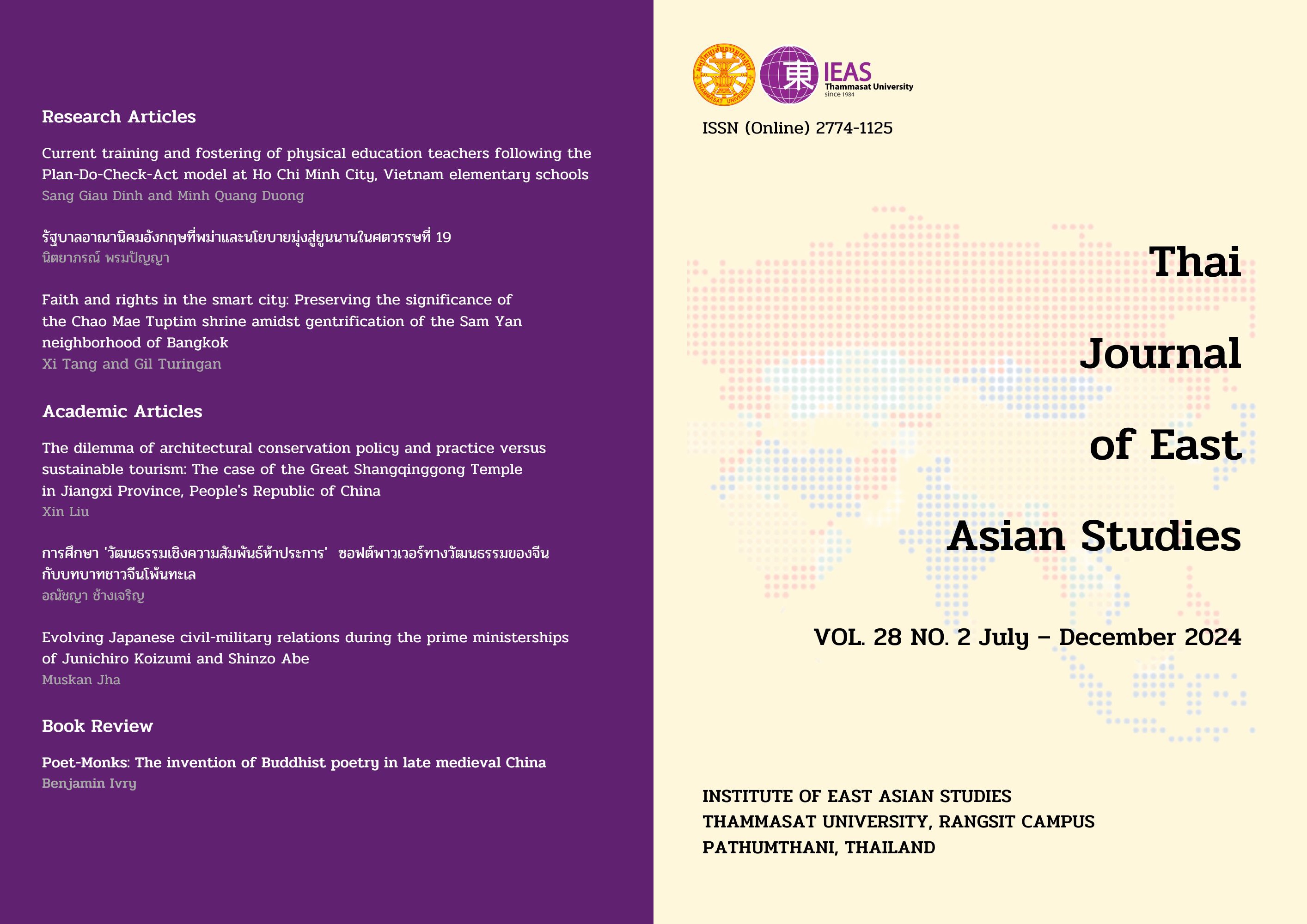รัฐบาลอาณานิคมอังกฤษที่พม่าและนโยบายมุ่งสู่ยูนนานในศตวรรษที่ 19
คำสำคัญ:
นโยบายมุ่งสู่ยูนนาน, ยูนนาน, รัฐบาลอาณานิคมอังกฤษที่พม่าบทคัดย่อ
บทความนี้วิเคราะห์พัฒนาการและปัจจัยที่ก่อให้เกิดนโยบายมุ่งสู่ยูนนานของรัฐบาลอาณานิคมอังกฤษที่พม่าในศตวรรษที่ 19 นอกจากนี้บทความนี้ยังวิเคราะห์ผลที่เกิดจากนโยบายมุ่งสู่ยูนนานของรัฐบาลอาณานิคมอังกฤษที่พม่าโดยใช้ระเบียบวิธีวิจัยทางประวัติศาสตร์เป็นหลักซึ่งวิเคราะห์เอกสารทางการทูตของอังกฤษเป็นเอกสารหลัก งานศึกษาเกี่ยวกับนโยบายมุ่งสู่ยูนนานของอังกฤษที่พม่านั้นมุ่งอธิบายในประเด็นการแข่งขันระหว่างรัฐบาลอังกฤษที่พม่าและรัฐบาลอาณานิคมฝรั่งเศสในอินโดจีนในการเข้าสู่ยูนนาน แต่บทความชิ้นนี้เสนอว่าปัจจัยที่สำคัญของการที่รัฐบาลอาณานิคมอังกฤษดำเนินนโยบายมุ่งสู่จีนนั้นเนื่องมาจากปัจจัยสำคัญคือ 1) มายาคติเรื่องความมั่งคั่งของยูนนาน และ 2) การขยายอำนาจของฝรั่งเศสในพม่า ผลคือรัฐบาลอาณานิคมอังกฤษที่พม่าเริ่มดำเนินนโยบายขยายการค้าไปยังยูนนานมากยิ่งขึ้น
Downloads
เอกสารอ้างอิง
จักรกริช สังขมณี. (2561). Limology: ชายแดนศึกษากับเขต-ขันธ์วิทยาของพื้นที่/ระหว่าง. สยามปริทัศน์.
นิตยาภรณ์ พรมปัญญา. (2547). ถนนพม่ากับการเปลี่ยนแปลงของดินแดนตอนใน (1937-1949) กรณีศึกษาเมืองบามอ [วิทยานิพนธ์มหาบัณฑิต ภาควิชาประวัติศาสตร์ จุฬาลงกรณ์มหาวิทยาลัย]. จุฬาลงกรณ์มหาวิทยาลัย
Bernard. (1885, August 11). Letter from Mr. Bernard to Mr. Durand (422/15). Foreign Office, The National Archives of the UK (TNA), United Kingdom.
Blackmore, Thaung. (1964). British quest for China trade by the routes across Burma (1826-1876). In W. Eberhard (Chair), Symposium on historical archeological and linguistic studies on Southern China, South-East Asia and the Hong Kong region [Symposium]. The Golden Jubilee Congress of the University of Hong Kong, University of Hong Kong, Hong Kong.
Chaudhuri, K. N. (1966). India’s Foreign Trade and the Cessation of the East India Company’s Trading Activities, 1828-40. The Economic History Review, 19(2), 345–363. https://doi.org/10.2307/2592256
Christian, J. L. (1940). Trans-Burma Trade Routes to China. Pacific Affairs, 13(2), 173–191. https://doi.org/10.2307/2751052
Colquhoun, A. R. (1883). Across Chrysê: being the narrative of a journey of exploration through the south china border lands from canton to mandalay. Sampson Low, Marston, Searle & Rivington.
Crawfurd, J. (1829). Journal of an Embassy from the Governor-General of India to the Court of Ava. Henry Colburn.
Croizier, R. C. (1962). Antecedents of the Burma Road: British Plans for a Burma-China Railway in the Nineteenth Century. Journal of Southeast Asian History, 3(2), 1–18. http://www.jstor.org/stable/20067386
Currie, P. Sir. (1885, December 9). Letter from Sir P. Currie to Mr. Godley (422/15). Foreign Office, The National Archives of the UK (TNA), United Kingdom.
Hart, R. Sir. (1885a, November 1). Letter from Sir R. Hart to Mr. Campbell (422/15). Foreign Office, The National Archives of the UK (TNA), United Kingdom.
Hart, R. Sir. (1885b, November 21). Letter from Sir R. Hart to Mr. Campbell, Peking (422/15). Foreign Office, The National Archives of the UK (TNA), United Kingdom.
Hart, R. Sir. (1885c, November 23). Letter from Sir R. Hart to Mr. Campbell (422/15). Foreign Office, The National Archives of the UK (TNA), United Kingdom.
Hart, R. Sir. (1885d, November 2). Letter from Sir R. Hart to Mr. Campbell (422/15). Foreign Office, The National Archives of the UK (TNA), United Kingdom.
Hooker, M. B. (1969). The East India Company and the crown 1773-1858. Malaya Law Review, 11(1), 1–37. http://www.jstor.org/stable/24863503
Jeshurun, C. M. (1967). Anglo-French Tensions on the Upper Mekong River 1892-1902 [Unpublished doctoral dissertation]. University of London.
Lally, J. (2021). Salt, Smuggling, and Sovereignty: The Burma-China Borderland, c. 1880–1935. The Journal of Imperial and Commonwealth History, 49(6), 1047–1081. https://doi.org/10.1080/03086534.2021.1985216
Lamington, Lord. (1891). Journey Through the Trans-Salwin Shan States to Tong-King. Proceedings of the Royal Geographical Society and Monthly Record of Geography, 13(12), 701–722. https://doi.org/10.2307/1801300
Liberman, Victor. (2003). Strange parallels volume 1: Integration on the Mainland Southeast Asia in Global Context, c. 800-1830. Cambridge University Press.
Margary, A. R. (1875). Note of a journey from hankow to ta-li fu. F. & C. Walsh.
Prasertkul, C. (1989). Yunnan trade in the nineteenth century: southeast china’s cross-boundaries functional system. Institute of Asian Studies, Chulalongkorn University.
Schendel, J. A. (2003). The Mandalay economy: upper Burma’s external trade, c. 1850 – 90 [Unpublished doctoral dissertation]. Uni Heidelberg.
Scott, J. C. (2009). The Art of Not Being Governed: An Anarchist History of Upland Southeast Asia. Yale University Press.
Shimada, R. (2019). Southeast Asia and International Trade: Continuity and Change in Historical Perspective. In K. Otsuka & K. Sugihara (Eds.), Paths to the Emerging State in Asia and Africa, Emerging-Economy State and International Policy Studies (pp. 55-71). Springer, Singapore. https://doi.org/10.1007/978-981-13-3131-2_3
Sprye, Richard. (1858). The British and China railway: from her Majesty’s port of Rangoon, in the Bay of Bengal, through Pegue & Burmah, to the Yunnan province of China: with loop-lines to Siam & Cambogia, Tonquin & Cochin-China. Her Majesty Secretary of state for foreign affaire. London.
Symes, Michael. (1885, Sebtember 24). Letter from Mr. Symes to Mr. Durand (422/15). Foreign Office, The National Archives of the UK (TNA), United Kingdom.
The Government of India. (1890, December 31), The Government of India to Chief Commissioner, Burmah (422/32). The National Archives of the UK (TNA), United Kingdom.
Van Schendel, W. (2002). Geographies of Knowing, Geographies of Ignorance: Jumping Scale in Southeast Asia. Environment and Planning D: Society and Space, 20(6), 647-668. https://doi.org/10.1068/d16s
Walsh, W. B. (1943). The Yunnan Myth. The Far Eastern Quarterly, 2(3), 272–285. https://doi.org/10.2307/2049213
Whewell, E. (2019). Legal Mediators: British consuls in Tengyue (western Yunnan) and the Burma-China frontier region, 1899–1931. Modern Asian Studies, 54(1), 1–28. doi:10.1017/S0026749X1800001X
ดาวน์โหลด
เผยแพร่แล้ว
รูปแบบการอ้างอิง
ฉบับ
ประเภทบทความ
สัญญาอนุญาต
ลิขสิทธิ์ (c) 2024 Thai Journal of East Asian Studies

อนุญาตภายใต้เงื่อนไข Creative Commons Attribution-NonCommercial-NoDerivatives 4.0 International License.



